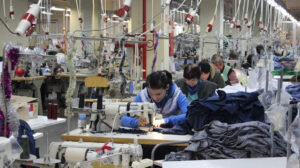
Mukachevo Knitting Factory Mriya PJSC (Mukachevo, Zakarpattia region) plans to hold an extraordinary general meeting of shareholders on February 12, 2026, in the form of a survey (remotely), according to the issuer’s announcement in the SMIDA information disclosure system.
The date for compiling the list of shareholders eligible to participate is set for February 9, 2026. Voting will end (the depositary institution will stop accepting ballots) at 6:00 p.m. on February 12.
The agenda includes issues related to significant transactions involving the alienation of the company’s real estate and movable property, the termination of the powers of the current members of the supervisory board and the election of new members, as well as the approval of the terms of agreements with members of the supervisory board.
Mukachevo Knitting Factory “Mriya” PJSC (EGRPOU 00307253) is registered in Mukachevo, legal address – 13 Tomas Masaryk Street; director – Tatyana Roshchina. The main activity is the production of underwear (KVED 14.14). According to OpenDataBot, the company’s revenue in 2024 amounted to UAH 20.047 million, its net financial result was minus UAH 7.284 million, and its assets amounted to UAH 20.641 million.
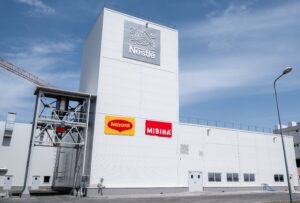
In 2025, Nestlé fully implemented its investment plan in Ukraine in the amount of UAH 9.5 billion and intends to increase capital investments in its new production site in Smoligov (Volyn region) to EUR70 million by the end of 2027, said Alessandro Zanelli, CEO of Nestlé in Ukraine and Southeast Europe, in a column for NV.
“At the beginning of the year, I announced that we planned to invest about UAH 9.5 billion in Ukraine, and we have fulfilled this forecast. In 2025, we achieved approximately double growth,” he wrote.
Zanelli named the launch of a new factory in Smoligov in April 2025 as a key industrial project of previous years. The initial investment in the facility amounted to EUR 43 million, but the company plans to expand its capacity. By the end of 2027, the total investment in this site is expected to reach EUR 70 million. The factory’s design capacity will allow it to produce 40,000 tons of vermicelli per year, which will be exported to Europe, the US, and Mexico.
Zanelli specified that production in Smoligov is highly automated, which allows for twice as few staff, but requires more highly skilled workers. To this end, the company has opened its own production academy.
In addition to industrial and commercial investments, Nestlé has allocated nearly $18 million to the Ukraine, WeCare program, which focuses on the safety, physical, and mental health of employees (excluding the cost of setting up shelters). The company also invests around EUR10 million annually in modernizing and improving the quality of its existing production facilities.
The CEO of Nestlé in Ukraine also announced that he will be moving to the position of head of the company’s Eastern European division in 2026 and leaving the Ukrainian office.
Nestlé began operations in Ukraine in 1994 with the opening of a representative office. In 1998, it acquired a controlling stake in ZAO Lviv Confectionery Factory Svitloch, and since 2018, it has owned 100% of the company’s shares. In May 2003, Nestlé Ukraine LLC was founded in Kyiv, and at the end of the same year, Nestlé became the owner of 100% of the shares of Volynholding.
In 2010, Nestlé SA acquired Technocom LLC in Kharkiv, a manufacturer of instant products under the Mivina trademark. In 2012, Nestlé Business Service (NBS Europe) was established in Lviv, which is one of seven Nestlé service centers in the world and provides support services to Nestlé divisions in more than 40 countries around the world.
Nestlé’s business in Ukraine is represented by the following areas: coffee and beverages, confectionery, culinary products (cold sauces, seasonings, soups, instant foods), baby and special nutrition, ready-made breakfasts, and pet food.

According to Serbian Economist, the authorities in Subotica have issued a permit for preparatory work prior to the construction of a mega-factory for the production of lithium-iron-phosphate (LFP) batteries.
The investor in the project is ElevenEs d.o.o. Subotica. The permit obtained relates specifically to site preparation—soil preparation, demolition of existing structures, and creation of ancillary infrastructure. A separate permit will be required for the construction of the production and auxiliary facilities themselves.
According to published data, the complex is planned on cadastral plot 36916/1 (Donji Grad) on a 178,001 sq. m. plot of land privately owned by the investor. The total gross area of the future facilities is stated at 24,607 square meters. The preliminary cost of preparatory work is estimated at 116.55 million dinars (excluding VAT), and work can begin after the decision comes into force and notification of the start of work is submitted.
The project for a mega LFP battery plant in Subotica, previously referred to as the first factory of its kind in Europe, was announced in 2023. According to earlier estimates, the total investment could amount to around €1 billion, and employment could reach around 1,000 people. In the first phase of hiring, ElevenEs planned to hire approximately 350 employees. At the same time, in 2025, industry reports also mentioned a target investment of EUR 700 million in two phases and about 1,000 jobs in the context of a declaration of support signed by the company with representatives of the European Commission and the Serbian Development Agency.
The declared capacity of the plant in Subotica is 1-2 GWh per year (depending on the production program), with a daily output of 3,000-8,000 batteries (depending on the type). The plan is to produce prismatic LFP blade cells (with side terminals), without nickel and cobalt, for stationary energy storage systems (wind, solar, etc.) and electric transport, including buses and trucks.
The project is important for Serbia’s economy as it integrates the country into the European energy storage supply chain, a segment that is accelerating along with the growth of renewable energy and electric vehicles. LFP technology is generally considered by the market to be a more affordable and thermally stable alternative to nickel and cobalt batteries, which increases the attractiveness of local production for mass applications and energy systems.
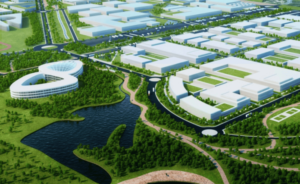
As of the end of 2025, 37 industrial enterprises have been built or are under construction in Ukraine’s industrial parks, of which 22 factories have already been built and 15 are under construction, according to the Ministry of Economy, Environment, and Agriculture. As reported, by the end of 2024, 25 industrial enterprises were operating or under construction in industrial parks, of which 12 had been built.
Among those operating or under construction as of the end of last year were enterprises in the fields of agro-processing, food production, furniture and woodworking, machine building, and others. Operating enterprises created 3,716 jobs.
The Ministry of Economy also recalls that in 2025, it decided to provide state incentives to 13 industrial parks for the implementation of 22 infrastructure projects totaling UAH 697.77 million.
In addition, UAH 202.91 million was transferred during the year to two industrial parks, the decisions on which were made in 2024.
Thus, the total amount of state incentives for industrial parks in 2025 amounted to UAH 900.681 million, the ministry concludes.
“2025 was the year when the number of industrial parks turned into real platforms for the implementation of the ”Made in Ukraine” policy. Almost UAH 1 billion in state incentives for industrial parks this year is an investment in infrastructure that is already giving life to new factories today. The state is laying the foundation, and business is turning it into new capacity and jobs,” Economy Minister Oleksiy Sobolev is quoted as saying in the statement.
As reported, 13 industrial parks received state incentives last year.
As of December 31, 2025, 118 industrial parks were included in the Register of Industrial Parks, of which 24 parks were included during 2025. At the same time, eight parks that did not carry out any activities were excluded from the Register.
The State Incentives for the Creation of Industrial Parks program provides for the development of engineering and transport infrastructure in industrial parks on a co-financing basis. State support may be directed toward the construction of roads, electrical networks, water supply and sewage systems, gas supply, and other technical solutions necessary for the launch of production.
State incentives provide for co-financing in a ratio of 50% to 50% for up to UAH 150 million per IP, and for de-occupied territories in a ratio of 80% to 20%.
The Ministry of Economy is implementing the program in cooperation with Ukreximbank, Oschadbank, Ukrgasbank, and Sens Bank.
A number of fiscal incentives are also provided for IP participants.
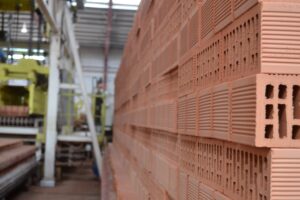
JSC Tascombank has put up for auction the Slobozhanska Budivelnaya Keramika (SBK) porous ceramic block factory in the Kyiv region on the OpenMarket electronic platform (SE “SETAM” of the Ministry of Justice), according to the SETAM press service.
The auction for the Kyiv branch of SBK is scheduled for January 2, 2026, with applications accepted until January 1 and a starting price of UAH 76.8 million. The property is located in the Kyiv region, Borodianka district, village of Ozery.
The lot includes a production complex with a total area of 15,906.4 square meters, 212 units of industrial equipment, and a land plot.
The sale includes the right to conclude a financial leasing agreement and a purchase and sale agreement for real estate and movable property belonging to the bank.
Auction details and terms of participation are available at: is.gd/Jr3aDv
The OpenMarket electronic auction has been operating in Ukraine since 2014 and is a convenient tool for purchasing and selling property online. In total, assets worth over UAH 26.7 billion have already been sold through the system.
AUCTION, building ceramics, FACTORY, PRODUCTION, TASCOMBANK, СБК
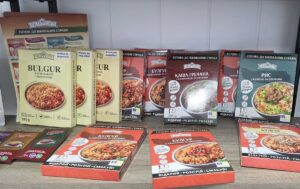
The Dnipro-based Sol Union group of companies has begun construction of the Neo Food System factory in the Kyiv region. The project capacity of the enterprise will allow it to produce 60,000 ready-made meals per day. The factory will produce ready-to-eat chilled, pasteurized, sterilized, and deep-frozen meals. The group’s investment in this project amounts to UAH 220 million.
This was announced by Dmytro Kysilevsky, Deputy Chairman of the Verkhovna Rada Committee on Economic Development. He noted that Sol Union took advantage of several programs of the “Made in Ukraine” policy for the development of Ukrainian manufacturers to implement its current investment projects. In particular, the group took advantage of a state grant of UAH 8 million for processing, purchasing autoclaves manufactured by the Rozfood plant in Kyiv. In addition, the group attracted loans from the “5-7-9” program. It plans to further expand its loan portfolio.
The launch of the plant will create 260 new jobs in the Kyiv region. The production area is 4,000 square meters.
To implement the Neo Food System factory project, the group purchased a ready-made industrial premises that already has the necessary connected electricity, water supply, treatment facilities, and drainage. The installation of the enterprise’s equipment will begin in April 2026. The launch of production is scheduled for June, and the project is expected to reach its design capacity in September 2026. The first exports to EU countries are planned for 2027.
The Sol Union group of companies includes two food production and packaging factories, a vegetable storage facility with a capacity of 5,000 tons, and warehouses with a total area of 17,000 square meters. Until now, all of the group’s enterprises were located in Dnipro.
The “Made in Ukraine” development policy for Ukrainian manufacturers combines state programs aimed at developing production, attracting investment, and stimulating exports.
FACTORY, FOOD, Kysilevsky, PRODUCTION, semi-finished product